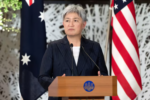EU Braces for Trump’s Return Amid Economic and Political Instability in Berlin and Paris
As Donald Trump prepares to return to the White House on January 20, the European Union faces significant challenges due to political instability in Germany and France, its two largest member states. Trump’s earlier threats to impose high tariffs on European products, reduce aid to Ukraine, and reconsider NATO funding have heightened tensions across the EU, reports DW.
Political Turmoil in Germany and France
Germany and France, often regarded as the “engine of the EU,” are entering this critical period with unstable governments. In Germany, Chancellor Olaf Scholz’s coalition of Social Democrats (SPD) and Greens has lost its parliamentary majority. With early elections scheduled for February 23, political stability in Berlin is unlikely before spring.
France’s situation is even more precarious. Since the 2024 elections, three major political blocs—Marine Le Pen’s far-right National Rally, the leftist New People’s Front, and President Emmanuel Macron’s centrist Together for the Republic—have been unable to cooperate, leading to a fragmented parliament. Prime Minister Michel Barnier’s government collapsed in December after failing to pass a budget. His successor, François Bayrou, faces similar hurdles. New elections are not expected before mid-2025.
Diverging Economic Strategies
The economic divide between Germany and France further complicates the EU’s ability to respond cohesively to Trump’s policy agenda. Germany remains committed to its strict debt brake, while France grapples with soaring deficits, exceeding the EU’s 3% GDP limit. France’s debt-to-GDP ratio is among the highest in the eurozone, and it recently faced a credit rating downgrade.
In Germany, the economy has stagnated, with Bundesbank projecting a growth rate of only 0.2% for 2025. Meanwhile, France’s Central Bank revised its 2025 growth forecast to 0.9%, citing rising uncertainty both domestically and internationally.
Trade Challenges and the Trump Factor
The Trump administration’s protectionist trade policies pose a renewed threat to the EU’s internal market. Negotiations over the Mercosur trade agreement—aimed at creating the largest free trade zone globally—remain stalled due to French opposition. While Germany supports such agreements to boost trade, France’s resistance underscores the lack of unity between the EU’s leading economies.
The prospect of Trump’s return adds urgency for the EU to address internal divisions. Experts warn that the bloc must move beyond reactive measures and focus on strengthening its internal market and infrastructure to withstand external pressures.
As Europe braces for Trump’s presidency, the fragility of the Berlin-Paris axis raises questions about the EU’s ability to present a unified front. Political and economic reforms, alongside enhanced cooperation between member states, will be crucial for navigating the turbulent years ahead.







